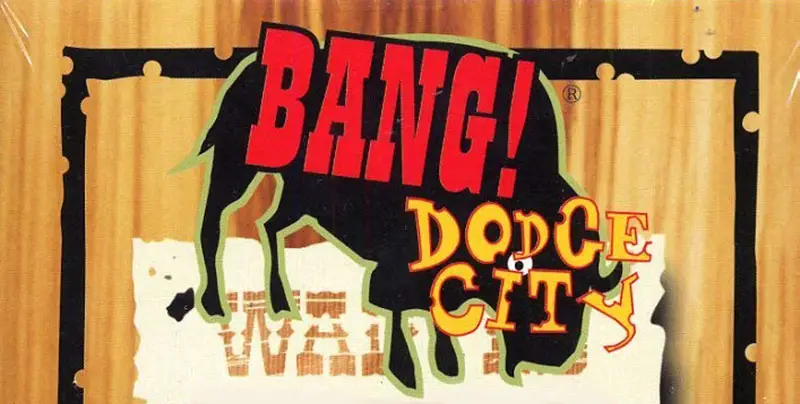
BANG! Dodge City is a double expansion that will make your BANG! games even more fun and challenging! The box includes the Dodge City expansion, featuring: new characters, new cards, and roles to accommodate up to 8 players!
The second expansion, High Noon, introduces a deck of special cards which change the rules of the game each turn!
You must have the basic set in order to play. You can play with either expansion separately, or you can combine them for even more "wild west" action!
Dodge City is a populous, chaotic, vibrant and... dangerous town! Its saloons are legendary, as are the characters stopping by. Attracted by the sudden richness of the city, bad guys walk the streets and shootouts appear on each day's menu.
Protecting Law and Order is a task only for the bravest of Sheriffs. Are you up to the challenge, or will you be visiting the world's most famous Boot Hill?
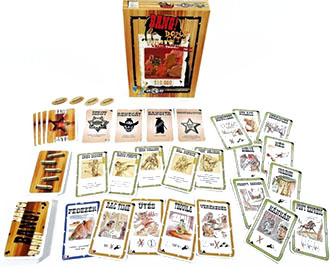
Components
- 8 "role" cards;
- 15 character cards;
- 40 playing cards;
- 1 summary card;
- 1 playing board;
- 4 bullets.
- Instructions
This expansion features 15 new characters (which are shuffled together with the original ones), and 40 new cards (to be shuffled with the basic playing cards).
There are also 8 role cards, 1 playing board, and additional bullets allowing you to play with eight players. The rules of the game remain the same as the original BANG! game, with the following additions:
Green-bordered Cards
Some of the new cards have a green border. These cards are played in front of you, face up, like the blue-bordered cards. To use an effect, you must take the card from in front of you and discard it. However, you cannot use green bordered cards on the same turn in which you have played them.
Each green-bordered card shows the symbols which explain its effect(s). Only the cards with a Missed!  Symbol can be used out of turn.
Symbol can be used out of turn.
Green-bordered cards can be removed through the play of a Cat Balou, Panic!, Can Can, etc. just like the blue-bordered cards.
Note that if you take a green card with cards like Panic! or Rag Time, you cannot use it on the same turn: in fact, you must take the card into your hand, then you have to play it in front of you, and wait until the next turn to use it.
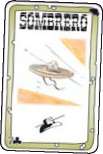
Example 1: You play a Sombrero in front of you. Starting with the next player's turn, you can discard it for the effect.
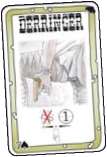
Example 2: You play a Derringer in front of you.
During one of your following turns, provided you still have the card in front of you, you can choose to discard it to cause a on a player at a distance of 1, and also draw a card from the deck.
The "Discard Another Card" Symbol 
Some of the cards show this new symbol, followed by an equal sign and other symbols. In order to have the effect(s) shown after the equal sign, you must discard this card along with any other card of your choice from your hand.
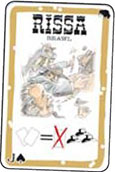
Example 3: You play a Brawl, discarding another card of your choice from your hand in addition to the Brawl card.
After doing so, the Brawl effect is to force all the other players to discard a card, either from his hand or from play, chosen by you (you can choose differently for each player).
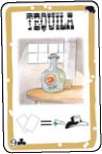
Example 4: You play a Tequila, and discard another card too. You choose any one player to regain one life point (you can even choose yourself).
Other Cards
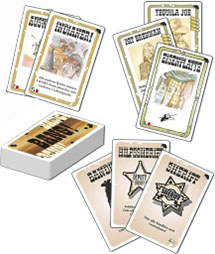
In this expansion you will also find cards that are identical to cards in the basic game: these are added in order to keep the "balance" among different cards in the deck.
You will also find cards that combine symbols you already know in different ways. Simply follow the meaning of the symbols shown to determine the card's effects.
Generally speaking, remember that:
any card with a Missed!
 symbol can be used to cancel the effect of a card with a BANG!
symbol can be used to cancel the effect of a card with a BANG!  symbol;
symbol;when you are losing your last life point, you can only use a Beer to avoid being eliminated from the game. You cannot use other cards with similar effects such as Saloon, Canteen, Tequila, or Whisky out of turn;
you can only play one BANG!
 card per turn, but you can play any number of other cards which show the symbol;
card per turn, but you can play any number of other cards which show the symbol;if your Dynamite does not explode, pass it to the first player to your left who does not already have a Dynamite in front of him (no player can ever have two identical cards face up in front of him).
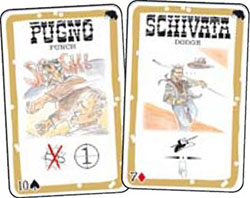
Example 5: In response to a Punch, you can play the Dodge: you cancel the Punch and then draw a card from the deck.
Rules for 8 Players
The expansion comes with 8 role cards, which replace the original ones (1 Sheriff, 2 Deputy, 3 Outlaw and 2 Renegade), plus one playing board and the additional bullets.
To play with 8 players, deal all these roles face down as usual. Each of the two Renegades plays on his own, and wins only if he is the last player alive. So, if in the final stages of the game the Sheriff is confronted by two Renegades, and the Sheriff is killed first, the Outlaws win!
Special Rules for 3 Players
Take these 3 role cards: Deputy, Outlaw, and Renegade. Give one of them randomly to each player, but place them face up on the table. Everyone knows the role of all three players.
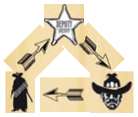
The goal of each player is determined by his role:
- the Deputy must kill the Renegade;
- the Renegade must kill the Outlaw;
- the Outlaw must kill the Deputy.
The game plays as usual, beginning with the Deputy.
You win as soon as you reach your goal, if you shot the final hit on your target (e.g., as a Deputy you must personally kill the Renegade).
If the other player dealt the final hit, then the goal for both survivors is to be the last man standing. For example, if the Outlaw killed the Renegade, then the Deputy did not win - he must now kill the Outlaw, who must in turn kill the Deputy in order to win.
However, any player who personally kills another one (regardless of his role) immediately draws 3 cards from the deck as a reward.
As there is no Sheriff, the Jail can be played on anyone.
Beer still has no effect when there are only 2 players left.
Bang! High Noon Expansion
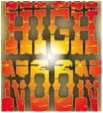
In the Wild West, the shootouts between the Outlaws and the Sheriff are becoming particularly tough.
Players must be ready to welcome the Daltons, keep cool during the gold rush, and be really careful when walking in the ghost town!
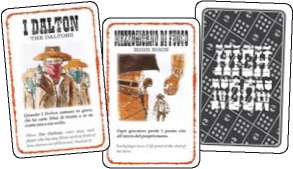
Components
13 special cards
Game Play
The game proceeds as normal BANG! with these changes: the Sheriff shuffles these cards separate from the regular cards face down and puts High Noon on top. Then he puts this stack face up near himself.
Starting with his second turn, before the Sheriff takes his turn, he removes the first card off the stack (taking care so that only the next card is revealed). He reads the card aloud, and then puts it in the center of the table creating a "High Noon" pile.
The card on top of the High Noon pile is now in play, and players must follow its effects until it is covered by a new card.
"At the start of his turn" means the card takes affect before any other action. High Noon stays in effect until the game ends.
The New Characters
-
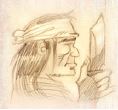
Apache Kid (3 life points): he is unaffected by cards from the suit of Diamonds played by the other players. During a Duel, his ability does not work.
-
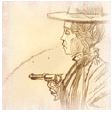
Belle Star (4 life points): during her turn, no card in front of any other player has any effect. This applies both to the blue- as well as to the green- bordered cards.
-
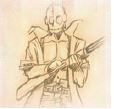
Bill Noface (4 life points): during phase 1 of his turn, he draws 1 card, plus 1 card for each injury (lost life point) he currently suffers.
So, if he is at full life, he draws 1 card; with one life point less, he draws 2 cards; with two life points less, he draws 3 cards, and so forth.
-
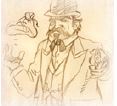
Chuck Wengam (4 life points): during his turn, he can choose to lose 1 life point to draw 2 cards from the deck. He may also use this ability more than once in the same turn; however, he cannot choose to lose his last life point this way.
-
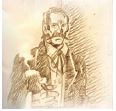
Doc Holyday (4 life points): once during his turn, he can discard any two cards from his hand for the effect of a BANG! against a player within range of his weapon.
This ability does not count towards his limit of one BANG! card per turn. To hit Apache Kid in this way, at least one of the two discarded cards must not be a Diamond.
-
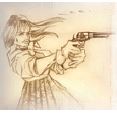
Elena Fuente (3 life points): she can use any card in her hand as a Missed!.
-
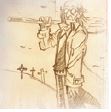
Greg Digger (4 life points): each time another character is eliminated, he regains 2 life points. As usual, he cannot exceed his initial number of life points in this way.
-
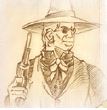
Herb Hunter (4 life points): each time another character is eliminated, he draws 2 extra cards from the deck. So, if he kills an Outlaw himself, he draws 5 cards.
-
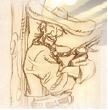
Jose Delgado (4 life points): during his turn he can discard a blue-bordered card from his hand to draw 2 cards from the deck. He may use this ability twice per turn.
-
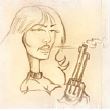
Molly Stark (4 life points): each time she plays or voluntarily discards a Missed!, Beer, or BANG! card when it is not her turn, she draws one card from the deck.
If she discards a BANG! during a Duel, she does not draw her replacement cards until the end of the Duel, when she would draw one card for each BANG! she used during the Duel.
Cards that she is forced to discard due to cards like Cat Balou, Brawl, or Can-Can are not considered voluntarily discarded!
-
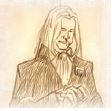
Pat Brennan (4 life points): during phase 1 of his turn, he may choose to draw the usual two cards from the deck, or, instead draw one card (and this one card only) from in play and add it to his hand.
The card can be in front of any player, and can be either a blue-bordered card or a green-bordered card.
-
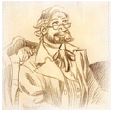
Pixie Pete (3 life points): during phase 1 of his turn, he draws 3 cards instead of 2.
-
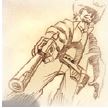
Sean Mallory (3 life points): in phase 3 of his turn, he can hold up to 10 cards in his hand. He does not have to discard any cards if he has more cards than the number of life points he has left, but less than 11.
-
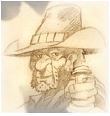
Tequila Joe (4 life points): each time he plays a Beer, he regains 2 life points instead of 1. He only regains 1 life point from similar cards like Saloon, Tequila, or Canteen.
-
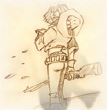
Vera Custer (3 life points): at the beginning of her turn, before drawing any cards (in phase 1), she chooses any other character still in play. Until her next turn, she has the same ability as that character.
Continue Reading


